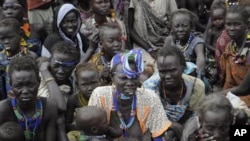The United States is urging the government of Sudan to open humanitarian access to an area of conflict where aid officials say people are running out of food. The Obama administration is also pushing for an end to the conflict over oil revenues between Sudan and South Sudan.
The U.S. special envoy for Sudan, Princeton Lyman, says Washington is “extremely concerned” about humanitarian conditions in the states of Southern Kordofan and Blue Nile where renewed hostilities between militants and government troops broke out last May.
With predictions of what he calls a “major humanitarian crisis” as soon as March, Ambassador Lyman says as many as a quarter-million people could be one step short of famine.
"This is very alarming to us," said Lyman. "We have strongly urged the government of Sudan to allow international humanitarian aid - that is World Food Program, UNICEF, etcetera - to come in in all parts, across the lines of whoever is holding territory. They have refused to do so. They don't want international involvement in this area which they think is an internal matter and a conflict area.”
Lyman says the United States is working with African Union allies to urge Khartoum to open international access to those areas quickly.
"We are under a lot of pressure if that doesn't happen to look at other alternatives, but they all contain serious risks in doing so,” added Lyman.
In one of those alternatives, he says, U.S. officials are considering sending humanitarian assistance across the border into Sudan without the approval of the government in Khartoum. But Lyman says no decision has been made to do that because of what he calls the “complications” that could cause.
Lyman told reporters in Washington Tuesday that he believes Khartoum is reluctant to open access to those areas because the government has “learned the lessons of Darfur” - that allowing humanitarian agencies into an area brings more attention to what else is going on there.
Lyman says the United States and African Union are also working to end a dispute between the two Sudans over oil revenue. The government of South Sudan gained control of about 75 percent of national oil production when it split from the north last July. Negotiations to compensate Khartoum for that loss have not yet produced an agreement.
The north imposed a $32-a-barrel surcharge on southern oil late last year. The south this week began shutting down production, accusing the north of stealing its oil.
"This is a very bad situation and both sides could get hurt very, very badly,” Lyman said.
Lyman says an African Union panel of former heads of state from South Africa, Burundi, and Nigeria is “very close” to a proposal to resolve the dispute.
"We are very concerned that this negotiation succeed before too much damage is done to the oil sector and the infrastructure that the South feels they can stop shutting off the production and go back to full production,” Lyman added.
Lyman says Washington is also working to ease tensions between ethnic Lou Nuer and ethnic Murle in the southern state of Jonglei. The sides have been at odds for years, but recent attacks on each other's villages have caused a undetermined number of casualties and raised alarm.
"This is a situation that demonstrates the tensions - traditional and otherwise - that exist in South Sudan that were set aside in the campaign for independence and the successful independence July 9, but are now coming to the surface, demonstrating how much the government of South Sudan must do to improve both its security sector capabilities, but also its outreach to these communities and conflict resolution and development programs here and elsewhere in South Sudan.”
South Sudan's President Salva Kiir and Sudan's President Omar al-Bashir are scheduled to discuss the dispute over oil revenue on the sidelines of this week's African Union summit in Addis Ababa.


















